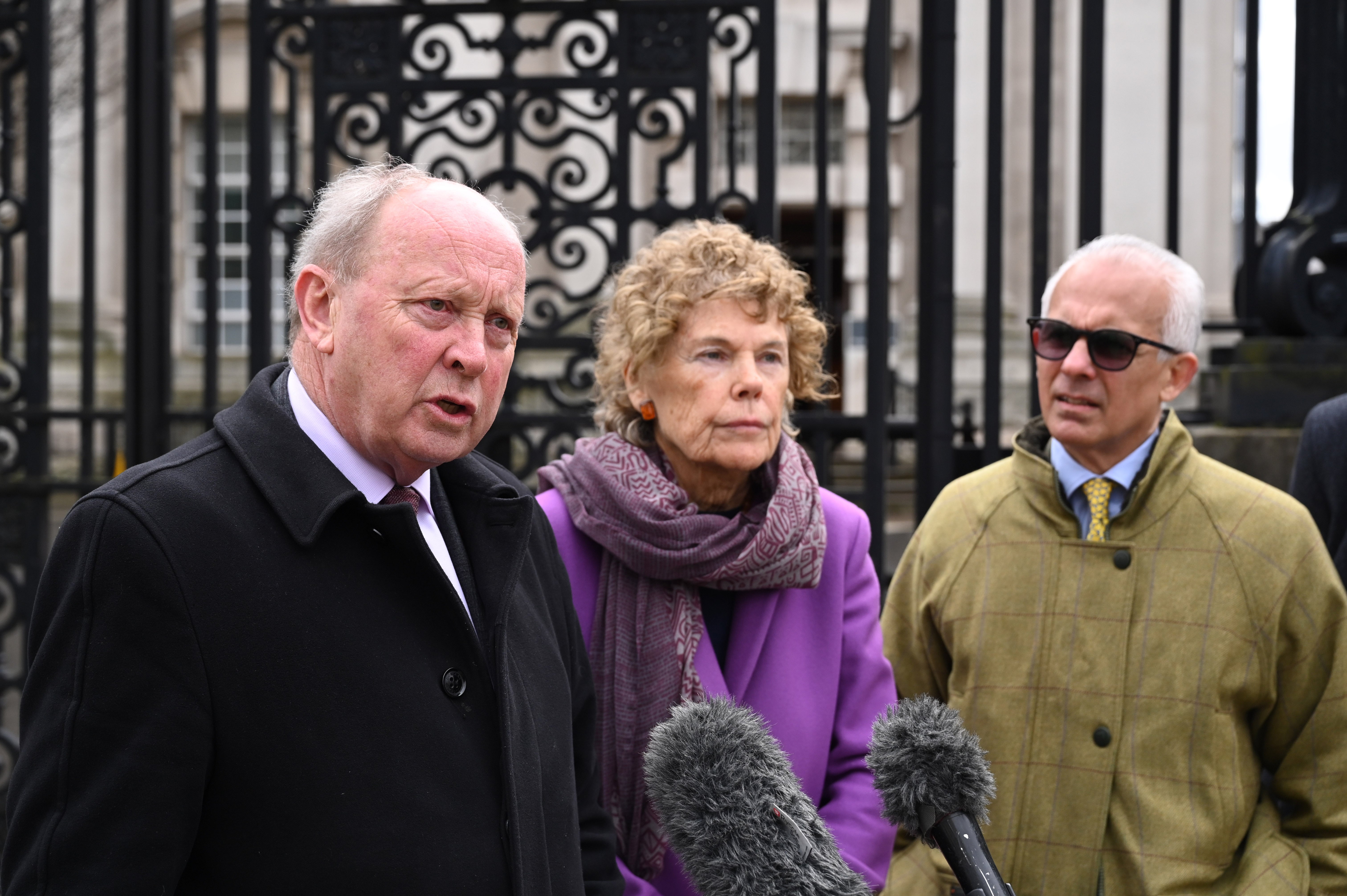Court upholds ruling that Northern Ireland Protocol is lawful
DUP leader Sir Jeffrey Donaldson said the case against the post-Brexit arrangements will go to the Supreme Court.

Your support helps us to tell the story
From reproductive rights to climate change to Big Tech, The Independent is on the ground when the story is developing. Whether it's investigating the financials of Elon Musk's pro-Trump PAC or producing our latest documentary, 'The A Word', which shines a light on the American women fighting for reproductive rights, we know how important it is to parse out the facts from the messaging.
At such a critical moment in US history, we need reporters on the ground. Your donation allows us to keep sending journalists to speak to both sides of the story.
The Independent is trusted by Americans across the entire political spectrum. And unlike many other quality news outlets, we choose not to lock Americans out of our reporting and analysis with paywalls. We believe quality journalism should be available to everyone, paid for by those who can afford it.
Your support makes all the difference.The Northern Ireland Protocol is lawful, the Court of Appeal in Belfast has upheld.
DUP leader Sir Jeffrey Donaldson said the legal challenge will now go to the Supreme Court.
Sir Jeffrey, whose party’s first minister, Paul Givan, resigned over the impact of the protocol, insisted it is undermining the position of Northern Ireland within the UK.
Unionists regard the post-Brexit trade arrangements, which see checks on goods arriving into Northern Ireland from Great Britain, as a border in the Irish Sea.
The legal challenge is another aspect of unionist action against the protocol, taken in the name of TUV leader Jim Allister, former Brexit Party MEP Ben Habib and Baroness Hoey among others.
However, that received a blow on Monday when the Court of Appeal in Belfast dismissed challenges pursued in the name of unionists and Brexiteers from across the UK.
Senior judges upheld the ruling last June by Mr Justice Colton, rejecting arguments that the protocol breached the terms of the 1800 Acts of Union and the 1998 legislation that underpins the Good Friday Peace Agreement.
An adjoined case was taken by Belfast pastor Clifford Peeples.
Appeals in both cases were dismissed.
Lady Justice Keegan said the senior judges determined none of the legal arguments prevail, and accordingly the appeals are dismissed and the decision of the trial judge affirmed.
Addressing the Court of Appeal on Monday, Lady Justice Keegan said the judicial review applications were out of time, but an extension was granted because “they raise issues of constitutional importance”.
“It is in the public interest that these issues be considered and determined by the highest court in this devolved administration,” she said.
She said the European Union Withdrawal Act, which includes the protocol, the Acts of Union and the Northern Ireland Act are all of a constitutional character, adding the issue is the interplay between them and how they should be interpreted.
In the ruling, senior judges ruled that while the Withdrawal Act conflicted with the Acts of Union, Parliament knew the legislation involved and acted lawfully in enacting the latter.
They also found that the Northern Ireland Act 1998 “has no impact on the legality of the changes enacted by the Withdrawal Agreement”.
In terms of the argument of a democratic deficit being caused by European laws that the people of Northern Ireland had no say in being imposed on them, the judges held that the justification for differential treatment “fell within the choices made in a ‘highly visible, political process'”, and rejected this ground of appeal.
Meanwhile, no merit was found in any of the additional arguments raised by Mr Peeples.
Sir Jeffrey reacted, saying the challenge “has always been destined for the Supreme Court”.
“But today’s ruling reminds us that the NI Protocol led to the abandonment of consensus politics as the Government and the pro-protocol parties embraced majority rule. Cross community voting was ditched by the protocol,” he said.
“Not one single unionist MLA supports the protocol because it undermines our place in the United Kingdom and separates us from our main market. It is driving up costs of doing business with the rest of the United Kingdom, hampering government efforts to help us in this cost-of-living crisis and even threatening our supply of medicines.
“The protocol has cast a long shadow over devolution and far from protecting stability, it has undermined the foundational principles of devolution.
“Northern Ireland only moves forward when we move forward together. Any deals will require the support of unionists and nationalists.
“I was patient when I warned the governments in London, Dublin and Washington last September that the protocol was not compatible with devolution. I gave space for talks and action but they failed to listen.”
The ruling underlines the need for stunt politics to stop. There is no credible alternative to the protocol
However, Sinn Fein MLA Declan Kearney welcomed the court ruling, adding the protocol is “here to stay”.
“This ruling is clear and unequivocal and the legal challenge by the unionist parties has been dismissed on all grounds,” he said.
“The ruling underlines the need for stunt politics to stop. There is no credible alternative to the protocol.
“Sinn Fein’s focus will remain on promoting the benefits of the protocol for our economy and society, to create jobs, to support people through the cost of living crisis, and to tackle the problems in the health service.”
Meanwhile, SDLP MLA Matthew O’Toole responded to the ruling by urging unionist politicians to focus on the cost of living crisis.
“With families struggling to heat their homes and the continent of Europe facing humanitarian catastrophe, the sight of politicians fixating on the protocol would be absurd, if it wasn’t so irresponsible,” he said.
“Where there are issues on GB-NI trade that require smoothing, the solution is through discussion and engagement – rather than collapsing political institutions and mounting quixotic legal challenges.”